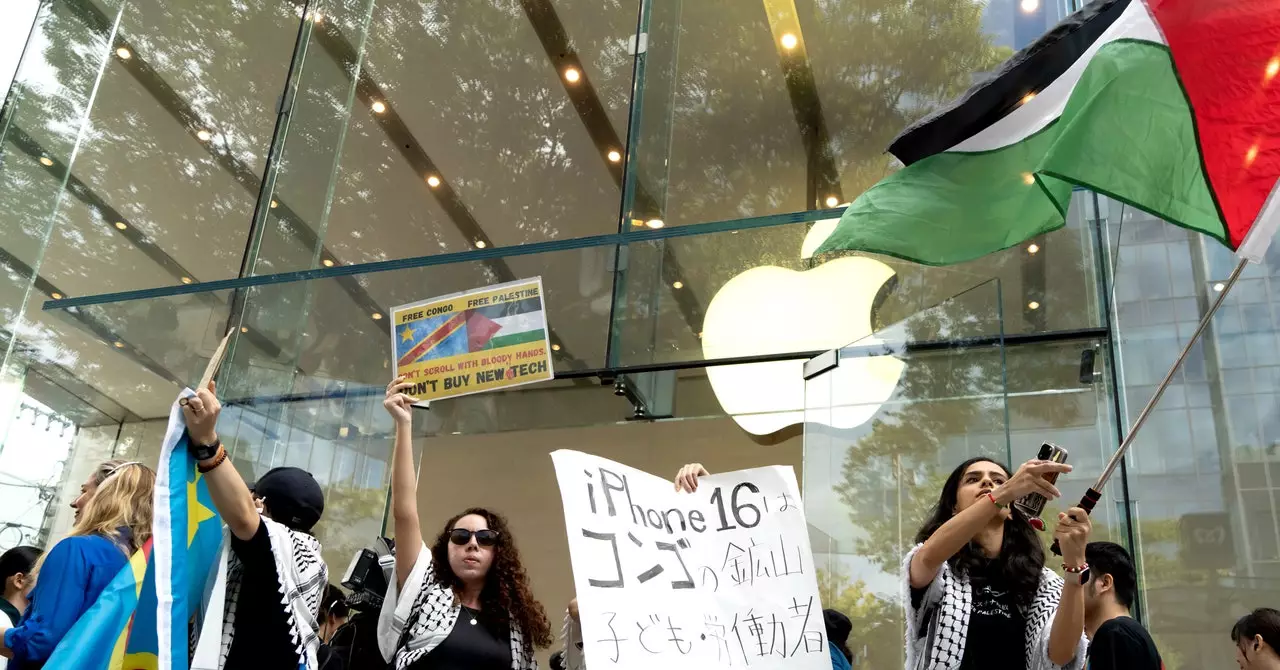On a significant day for Apple Inc., as the tech giant rolled out its highly anticipated iPhone 16, a global phenomenon unfolded outside its stores—protests. Organized by a coalition of Apple employees and activists, these demonstrations spotlighted critical issues surrounding ethical production and corporate responsibility. In an intriguing contrast to the consumer excitement, the protests raised poignant questions about the human cost of technology and the accountability of one of the world’s largest corporations.
Consumerism Meets Activism
Black-clad protesters lined the streets outside Apple Stores, chanting slogans that echoed concern and outrage. Signs that read “Profiting from genocide” and calls for the ban on cobalt sourced from the Democratic Republic of the Congo (DRC) reflected deep-seated issues that many consumers might overlook while queuing for the latest gadget. This juxtaposition between the joy of acquisition and the somber realities of supply chains served as a stark reminder that modern consumerism often neglects the ethical implications behind the products we cherish.
The Democratic Republic of the Congo is infamous for its dire mining conditions, notorious for dangerous labor practices, child exploitation, and pervasive human rights violations. Apple’s continuing relationship with these mines is under scrutiny, despite their statements asserting that they do not source minerals from operations with such conditions. The company admits to challenges in tracking these complex supply chains, a reality that further complicates the ethics of consumer technology.
While Apple has made strides in attempts to address human rights within its supply chain—removing 12 suppliers in 2022 due to these challenges—the revelations about potential “blood minerals” being part of their sourcing raised alarms. Critics argue that a corporate commitment to ethical sourcing must encompass more than mere statements; it demands transparency and action that can be scrutinized by independent observers. Protesters seized the launch day to amplify their cause, aware that public attention surrounding the iPhone 16 would offer a prime opportunity for engagement.
Beyond commodities, the protests also highlighted Apple’s perceived silence regarding the ongoing conflict in Gaza. Activists argue that consumer advocacy also extends to geopolitical issues. The call for Apple to take a stand against what some have described as genocide invites larger discussions about the role of corporations in social justice movements, particularly in turbulent global contexts.
Central to this wave of activism is the group called Apples Against Apartheid, a collective formed by both current and former Apple employees. Their campaign evolved from the earlier initiative, Apples4Ceasefire, as they aligned with organizations like Friends of the Congo and various local activist groups worldwide. This grassroots approach has empowered individuals, allowing them to mobilize around shared concerns regarding ethical practices in the tech industry.
With protests organized across ten countries—from the United States to Japan and Europe—Apple’s corporate image faced a galvanizing challenge. Notably, cities like Berlin boasted some of the largest gatherings, with demonstrators uniting behind their banners despite facing police pushback. One organizer, Tariq Ra’Ouf, articulated a clear mission: to disrupt Apple’s flagship sales event while educating consumers about the broader implications of their purchases.
As the iPhone 16 launch day came and went, it became increasingly evident that issues of ethical sourcing and corporate accountability will not fade into the background. The protests served not only as a wake-up call to consumers but as a challenge to Apple and other tech giants to engage with the ethical dilemmas of their production processes. Activism in the realm of technology is a burgeoning movement, signaling a future where consumers may demand more than just the latest gadget; they may seek assurance that their purchases do not come at the expense of human rights.
In a world where consumers wield significant power, the responsibility falls on corporations to ensure their practices reflect a commitment to social justice. The events surrounding the iPhone 16 launch narrative underscore the growing intersection of consumerism and activism, signifying a shift in how technology is consumed and perceived in today’s society.

